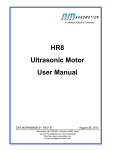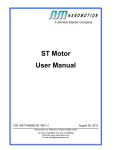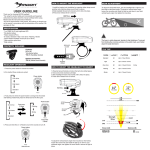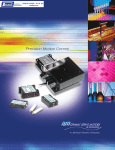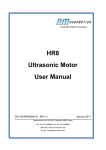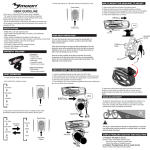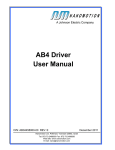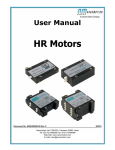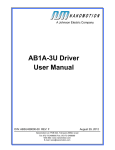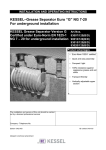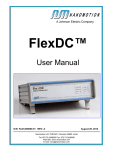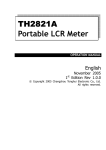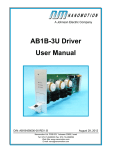Download FB Positioning Systems User Guide
Transcript
FB Positioning Systems User Guide FB00458000-01 REV:B Nanomotion Ltd. POB 623, Yokneam 20692, Israel Tel: 972-73-2498000 Fax: 972-73-2498099 Web Site: www.nanomotion.com E-mail: [email protected] August 29, 2012 FB Positioning Systems. User Guide Copyright Copyright This document contains proprietary information of Nanomotion Ltd., and may not be reproduced in any form without prior written consent from Nanomotion Ltd. No part of this document may be reproduced, translated, stored in a retrieval system or transmitted in any form and by any means, electronic, mechanical, photographic, photocopying, recording, or otherwise, without the written permission of Nanomotion Ltd. Information provided in this document is subject to change without notice and does not represent a commitment on the part of Nanomotion Ltd. Copyright 2009 - 2012, Yokneam, Israel. All rights reserved. All products and company names are trademarks or registered trademarks of their respective holders. Nanomotion Ltd. 2 FB Positioning Systems. User Guide Limited Warranty Nanomotion Ltd. (hereinafter NM) warrants the product (other than software) manufactured by it to be free from defects in material and workmanship for a period of time of one year (except those parts normally considered as consumable/expendable components such as motor conditioning brushes). The warranty commences thirty (30) days from the date of shipment. NM warrants those parts replaced under warranty for a period equal to the remaining warranty coverage of the original part. NM’s sole and exclusive obligation under this warranty provision shall be to repair, or at its sole option exchange defective products or the relevant part or component, but only if: (i) the Purchaser reports the defect to NM in writing and provides a description of the defective product and complete information about the manner of its discovery within ten (10) days of its discovery; (ii) NM has the opportunity to investigate the reported defect and to determine that the defect arises from faulty material, parts or workmanship; and (iii) the Purchaser returns the affected product to a location designated by NM. These provisions constitute the exclusive remedy of the Purchaser for product defects or any other claim of liability in connection with the purchase or use of NM products. This warranty policy applies only to NM products purchased directly from NM or from an authorized NM distributor or representative. This warranty shall not apply to (i) products repaired or altered by anyone other than those authorized by NM; (ii) products subjected to negligence, accidents or damage by circumstances beyond NM control; (iii) product subjected to improper operation or maintenance (i.e. operation not in accordance with NM Installation Manuals and/or instructions) or for use other than the original purpose for which the product was designed to be used. NM shall not in any event have obligations or liabilities to the Purchaser or any other party for loss of profits, loss of use or incidental, increased cost of operation or delays in operation, special or consequential damages, whether based on contract, tort (including negligence), strict liability, or any other theory or form of action, even if NM has been advised of the possibility thereof, arising out of or in connection with the manufacture, sale, delivery, use, repair or performance of the NM products. Without limiting the generality of the preceding sentence, NM shall not be liable to the Purchaser for personal injury or property damages. Patent Information Nanomotion products are covered under one or more of the following registered or applied for patents. 5,453,653; 5,616,980; 5,714,833; 111597; 5,640,063; 6,247,338; 6,244,076; 6,747,391; 6,661,153; 69838991.3; 6,384,515; 7,119,477; 7,075,211; 69932359.5;1186063; 7,211,929; 69941195.5; 1577961; 4813708; 6,879,085; 6,979,936; 7,439,652; 7061158 ;1800356; 1800356; 1800356; 2007-533057 (pending); 2011-093431 (pending); 7,876,509; 10-2007-7009928 (pending); 200780019448.6 ; 7713361.9 (pending); 12/294,926 (pending); GB2008000004178 (pending); GB2009000003796 (pending); 12/398,216 (pending); GB2446428; Nanomotion Ltd. 3 FlexDC TM User Manual Limited Warranty 12/517,261 (pending); 08702695.1 (pending); 10-2009-7017629 (pending); 12/524,164 (pending); 12/581,194 (pending) Nanomotion Ltd. 4 FlexDC TM User Manual Limited Warranty Revision History Revision Release date Details 00/A Apr 2009 New release 01/A Jan 2011 Added UHV connection wires schema. Added an”Important” note as to run the system before operation. Added deteails about configurations which include interpolator. Added updated EOP information. 01/B Feb 2011 Updated the “Stage Heat Dissipation considerations” section semantics NA Aug. 2012 Administrative change – added patent information section in front matter. Nanomotion Ltd. 5 FB Positioning Systems. User Guide Table of Contects Table of Contents 1 PREFACE ........................................................................................................................ 9 1.1 About This User Guide ............................................................................................ 9 1.2 Who Should Use This User Guide ........................................................................... 9 1.3 Nanomotion Products Reference Documentation .................................................... 9 1.4 Safety Precautions ................................................................................................ 10 2 FB SERIES .................................................................................................................... 11 2.1 Introduction ........................................................................................................... 11 2.2 Features ................................................................................................................ 11 2.3 Stage Configurations ............................................................................................. 11 2.4 Available Configurable Assemblies ....................................................................... 12 2.5 Encoder Options.................................................................................................... 12 3 QUICK START ............................................................................................................... 13 3.1 Unpacking the Stage ............................................................................................. 13 3.2 Stage Installation ................................................................................................... 14 3.3 Connecting and Turning On the System ................................................................ 15 4 MECHANICAL DRAWINGS........................................................................................... 18 4.1 FB050 Layout ........................................................................................................ 18 4.2 FB075 Layout ........................................................................................................ 19 4.3 FB100 Layout ........................................................................................................ 20 4.4 FB150 Layout ........................................................................................................ 21 5 TECHNICAL SPECIFICATIONS .................................................................................... 22 5.1 Straightness and Flatness ..................................................................................... 22 5.2 Maximum Load Capacity ....................................................................................... 22 5.3 Position Repeatability ............................................................................................ 22 5.4 FB050 Series ........................................................................................................ 23 5.5 FB075 Series ........................................................................................................ 23 5.6 FB100 Series ........................................................................................................ 24 Nanomotion Ltd. 6 FB Positioning Systems. User Guide 5.7 Table of Contects FB150 Series ........................................................................................................ 24 6 MOTOR DYNAMIC PERFORMANCE ............................................................................ 25 6.1 Settling Time ......................................................................................................... 25 6.2 Thermal Envelope of Performance (EOP) for HR Motors ...................................... 26 6.3 Standard Motor Connector Pinout ......................................................................... 35 6.4 Ultra-High Vacuum Motor Connection Wires ......................................................... 37 6.5 A Quad B Encoder Connector Pinout .................................................................... 38 6.6 Sin/Cos Encoder Connector Pinout ....................................................................... 38 7 ORDERING INFORMATION .......................................................................................... 39 7.1 Part Numbering Scheme ....................................................................................... 39 7.2 Example Configurations ........................................................................................ 39 8 CONTACT INFORMATION ............................................................................................ 40 8.1 Customer Service .................................................................................................. 40 8.2 General Inquiries and Ordering ............................................................................. 40 Nanomotion Ltd. 7 FB Positioning Systems. User Guide Lists List of Figures Figure 1: Removing the Shipping Bracket ........................................................................... 13 Figure 2: FB050 Stage Layout ............................................................................................ 18 Figure 3: FB075 Stage Layout ............................................................................................ 19 Figure 4: FB100 Stage Layout ............................................................................................ 20 Figure 5: FB150 Stage Layout ............................................................................................ 21 Figure 13: Motor Velocity vs. Command.............................................................................. 28 Figure 14: Motor Force vs. Velocity at the Various Work Regimes (a-g)............................. 29 Figure 15: Velocity vs. Command Using the AB5/AB51 Driver ............................................ 31 Figure 16: Force vs. Velocity Using the AB5/AB51 Driver at the Various Work Regimes (a-h) ............................................................................................................................. 32 Figure 6: Standard Motor Connector ................................................................................... 35 Figure 7: UHV Motor Connection Wires .............................................................................. 37 Nanomotion Ltd. 8 FB Positioning Systems. User Guide Preface 1 Preface 1.1 About This User Guide This user guide provides instructions for unpacking, connecting and operating the FB positioning system. It also includes details of the various Nanomotion FB positioning systems' available configurations, motor performance specifications and mechanical layouts. For user's convinience, the FB positioning system is refered to as stage, further in this user guide. 1.2 Who Should Use This User Guide This user guide is intended for engineers or technicians, directly involved in installation, operation and maintenance of positioning systems and control systems. Before starting the procedure outlined in this user guide, make sure that you read the Safety Precautions section outlined below and follow all safety guidelines as described further on in this user guide. 1.3 Nanomotion Products Reference Documentation The following documents contain additional information, related to the FB Positioning Systems, which can be found on Nanomotion website as well: ● AB5 and AB51 Drivers User Manual ● AB1A / AB2 / AB4 Driver User Manuals ● FlexDC Controller HW User Manual (includes Quick Start!) ● FlexDC Controller SW User Manual ● HR2 / HR4 / HR8 Motor User Manuals ● Nanomotion Vacuum and Ultra High Vacuum Motors Bake-out Procedure. Nanomotion Ltd. 9 FB Positioning Systems. User Guide Preface 1.4 Safety Precautions WARNING! • Do not remove the cover of the motor or disassemble its connector. High voltage hazard! • Before operating the stage, ensure that the motors are grounded. CAUTION: • Ensure that the stage is not subjected to mechanical shock. • Do not immerse the stage in any liquid or cleaning agent. Use only a clean cloth to wipe the stage. • The HR motors are not user-serviceable. • In case the motor had been remounted, perform the conditioning procedure (refer to motor user manual). • Follow the Quick Start instructions provided in this guide before operating the stage. • Motor operation must adhere to a specific duty cycle (refer to motor user manual or refer to the EOP chapter, further in this user guide). Nanomotion Ltd. 10 FB Positioning Systems. User Guide FB Series 2 FB Series 2.1 Introduction The FB series product line is a family of standard linear positioning systems (stages), designed for modular single and multi-axis, applications. The stage configuration utilizes cross roller bearings, a linear optical encoder and Nanomotion ceramic servo motors. The stages are offered in a wide range of widths and travel lengths and encoder resolutions to achieve a range of performance criteria. Various motors sizes are available for each configuration to meet necessary force/acceleration requirements. 2.2 Features ● Compact stage design with low profile. ● Direct drive motor with simple, robust construction. ● Linear encoder mounted in the center for optimum positioning (eliminating Abby Error). ● Easily configurable in multi-axis. ● Wide range of slide sizes, travels and motor sizes. 2.3 Stage Configurations Series Width Motor Options Standard Travels (mm) FB050 50 mm HR2 or HR4 20, 50, 75 FB075 75 mm HR4 or HR8 40, 60, 100, 150 FB100 100 mm HR4 or HR8 60, 100, 150, 200, 300 FB150 150 mm HR4 or HR8 100, 150, 200, 300 Nanomotion Ltd. 11 FB Positioning Systems. User Guide FB Series 2.4 Available Configurable Assemblies Nanomotion supplies the FB stages in following multi-axes configurations: ● X/Y ● X/Z using angle bracket ● X/Y/Z using angle bracket ● Vacuum versions available Nanomotion also configures assemblies with integrated Theta and Goniometer stages providing rotation/tip/tilt. Contact Nanomotion technical support for more information, see chapter 8. IMPORTANT: • Nanomotion supplies lubricated vacuum and ultra high vacuum stages by means of "Apiezon® Grease, Type M" high vacuum grease. Other type of grease is optional. • Each stage has integrated non-adjustable mechanical hard stops. 2.5 Encoder Options Encoder Resolution (1) Optional / Standard Reference Mark (2) External Interpolator Box (3) 1 μm Optional Included -- 0.5 μm Optional Included -- 0.1 μm Standard Included -- 50 nm Optional Included Included 10 nm Optional Included Included Analog output (Sin/Cos) Optional Included -- Notes: (1) All standard FB stages are provided with 0.1μm resolution linear encoders. (2) Reference Mark: magnetic non-adjustable Home Sensor. (3) All vacuum stages are supplied with an external interpolator box. Nanomotion Ltd. 12 FB Positioning Systems. User Guide Quick Start 3 Quick Start 3.1 Unpacking the Stage Nanomotion delivers the FB stage for vacuum environment double-bagged per Class1000 clean room standards. The non-vacuum FB stages are delivered in a Nanomotion standard packaging. Non-vacuum FB stages with 50nm and 10nm encoder resolution and all vacuum FB stages include an external encoder interpolator box (interpolator), (see section 2.5). 3.1.1 All FB stages are delivered with their axes locked by shipping brackets. Before stage operation remove the shipping bracket by means of screwdriver, see Figure 1: Slide Shipping bracket Base Screwdriver Figure 1: Removing the Shipping Bracket 3.1.2 After removing the shipping bracket, fasten the screws back to their original location at the end of the rail, by applying a proper torque. Nanomotion Ltd. 13 FB Positioning Systems. User Guide Quick Start 3.2 Stage Installation CAUTION Install the stage in a location free of excessive vibration. 3.2.1 Attach the stage to a user-prepared mounting surface (refer to chapter 4 "Mechanical Drawings" for interface). The recommended level of flatness for attachment surface is 20µm or less. 3.2.2 Attach the payload to the stage (refer to chapter 4 "Mechanical Drawings" for interface). Nanomotion Ltd. 14 FB Positioning Systems. User Guide Quick Start 3.3 Connecting and Turning On the System IMPORTANT: • Make sure all stage motors and encoders are connected to the corresponding axis on the servo controller. • The motors and the encoders are already aligned and adjusted by Nanomotion and their performance is verified. • Nanomotion guarantees proper driver and motor performance only when using Nanomotion-supplied cables. • Nanomotion supplies conditioned stages. Perform conditioning only in case a motor had been remounted (refer to motor user manual). • As to vacuum (V) and ultra-high vacuum (UHV) stages: Nanomotion supplies clean V and UHV motors, yet the bake-out is required in order to remove residual contaminants and absorbed humidity from the motors and other system components. Refer to the "Nanomotion Vacuum and Ultra High Vacuum Motors Bake-out Procedure", D/N: HR00458001. CAUTION: • Shortening the motor cable length may damage the motor. Do not attempt to shorten the cable without prior confirmation by Nanomotion. • Extending the motor cable does not damage the motor; however it might affect its performance. Nanomotion Ltd. 15 FB Positioning Systems. User Guide Quick Start 3.3.1 Connect the motor to the Nanomotion driver (refer to driver user manual for more information). Refer to section 6.3 for Standard Motor Connector Pinout and section 6.4 for Ultra-High Vacuum Motor Connection Wires. • The Motor_Connected interlock is available on Nanomotion standard motor connector. It disables high voltage on the bare driver output connector, when the motor disconnected from the driver. • Nanomotion’s motors run at a resonant frequency and are sensitive to the capacitance of the electrical circuit. Changing cable length affects the total capacitance (refer to driver user manual for maximum allowed cable length). • Nanomotion provides motors with specific low capacitance cable as follows: ◘ Standard motors: 210pF/meter ◘ Vacuum motors: 43pF/meter 3.3.2 Connect the driver to the user's servo controller (refer to driver user manual and controller user manual for pinouts and interconnection information). 3.3.3 For stage configuration without the interpolator, skip to section 3.3.4, otherwise, perform steps (a) to (c) to connect the interpolator: (a) Connect the encoder output to the interpolator input (refer to section 6.5 for encoder's pinout). (b) Connect the interpolator output (see section 6.5 for the A Quad B Encoder Connector Pinout) to the controller. (c) Proceed to section 3.3.5. 3.3.4 Connect the encoder to the servo controller (refer to section 6.5 and section 6.6 for encoders' pinouts; refer to controller user manual for pinout and interconnection details). 3.3.5 Connect the servo controller to the PC. 3.3.6 Connect the proper external power supply to the driver (refer to the driver user manual for more information). Nanomotion Ltd. 16 FB Positioning Systems. User Guide Quick Start 3.3.7 Connect the servo controller to power supply source (refer to the controller user manual for more information). 3.3.8 Before operating the stage, refer to the controller user manual for servo parameters tuning and operation instructions. 3.3.9 Turn the servo controller on (ensure there is no command when turning the power on). IMPORTANT: After unpacking the stage or if is unused for an extended period of time (over a week), run the stage with relaxed servo settings, several times, the whole travel, so it resumes its equilibrium. CAUTION: Avoid prolonged operation in an unstable condition (excessive vibration and noise) during the tuning process. Nanomotion Ltd. 17 FB Positioning Systems. User Guide Mechanical Drawings 4 Mechanical Drawings 4.1 FB050 Layout FB050-020-0.1M2 FB050-020-0.1M4 FB050-050-0.1M2 FB050-050-0.1M4 FB050-075-0.1M4 Figure 2: FB050 Stage Layout Nanomotion Ltd. 18 A (mm) 50 50 75 75 100 B (mm) 55 55 80 80 105 FB Positioning Systems. User Guide Mechanical Drawings 4.2 FB075 Layout FB075-040-0.1M4 FB075-060-0.1M4 FB075-060-0.1M8 FB075-100-0.1M4 FB075-100-0.1M8 FB075-150-0.1M4 FB075-150-0.1M8 Figure 3: FB075 Stage Layout Nanomotion Ltd. 19 A (mm) N/A N/A N/A 110 110 160 160 B (mm) 75 100 100 125 125 175 175 C (mm) N/A N/A N/A 110 110 160 160 FB Positioning Systems. User Guide Mechanical Drawings 4.3 FB100 Layout FB100-060-0.1M4 FB100-060-0.1M8 FB100-100-0.1M4 FB100-100-0.1M8 FB100-150-0.1M8 FB100-200-0.1M8 Figure 4: FB100 Stage Layout Nanomotion Ltd. 20 A (mm) N/A N/A 120 120 160 200 B (mm) 120 120 160 160 200 280 C (mm) N/A N/A 120 120 160 200 FB Positioning Systems. User Guide Mechanical Drawings 4.4 FB150 Layout FB150-100-0.1M8 FB150-150-0.1M8 FB150-200-0.1M8 Figure 5: FB150 Stage Layout Nanomotion Ltd. 21 A (mm) N/A 175 225 B (mm) 150 200 250 C (mm) N/A 175 225 FB Positioning Systems. User Guide 5 Technical Specifications 5.1 Straightness and Flatness Starightness & Flatness FB050 FB075 FB0100 FB150 2.5μm/25mm travel 2.5μm/25mm travel 2.5μm/25mm travel 1.5μm/25mm travel 5.2 Maximum Vertical Load Capacity Maximum Vertical Load Capacity (kg) Travel (mm) FB050 FB075 FB0100 FB150 20 2 - - - 40 - 5 - - 50 5 - - - 60 - 5 10 - 75 7 - - - 100 - 7 12 20 150 - 10 12 25 200 - - - 25 FB075 FB0100 FB150 5.3 Position Repeatability Encoder 0.1μm standard 10nm optional 50nm optional 0.5μm optional 1.0μm optional Nanomotion Ltd. FB050 ±0.5 μm ±50 nm ±200 nm ±2 μm ±3 μm 22 FB Positioning Systems. User Guide Technical Specifications 5.4 FB050 Series Propeties Travel Stiffness Dynamic Static Stage Moving “K”** Stall Force Holding Mass Mass (mm) (N/µ) (N)* Force (N)* (g) (g) FB050-020-0.1M2 20 1.8 8 7 385 150 FB050-020-0.1M4 20 2.8 16 14 400 150 FB050-050-0.1M2 50 1.8 8 7 595 266 FB050-050-0.1M4 50 2.8 16 14 610 266 FB050-075-0.1M4 75 2.8 16 14 700 400 * Specified values are within ±10% range. ** Refer to section 6.1 for Settling Time calculation. 5.5 FB075 Series Propeties Travel Stiffness Dynamic Static Stage Moving “K”** Stall Force Holding Mass Mass (mm) (N/µ) (N)* Force (N)* (g) (g) FB075-040-0.1M4 40 2.8 16 14 650 302 FB075-060-0.1M4 60 2.8 16 14 920 405 FB075-060-0.1M8 60 3.5 30 28 1035 412 FB075-100-0.1M4 100 2.8 16 14 1125 505 FB075-100-0.1M8 100 3.5 30 28 1230 515 FB075-150-0.1M4 150 2.8 16 14 1515 710 FB075-150-0.1M8 150 3.5 30 28 1620 720 * The specified values are within ±10% range. ** Refer to section 6.1 for Settling Time calculation. Nanomotion Ltd. 23 FB Positioning Systems. User Guide Technical Specifications 5.6 FB100 Series Propeties Travel Stiffness Dynamic Static Stage Moving “K”** Stall Force Holding Mass Mass (mm) (N/µ) (N) * Force (N)* (g) (g) FB100-060-0.1M4 60 2.8 16 14 1580 690 FB100-060-0.1M8 60 3.5 30 28 1690 700 FB100-100-0.1M4 100 2.8 16 14 2040 920 FB100-100-0.1M8 100 3.5 30 28 2145 930 FB100-150-0.1M8 150 3.5 30 28 2625 1160 FB100-200-0.1M8 200 3.5 30 28 3500 1600 * The specified values are within ±10% range. ** Refer to section 6.1 for Settling Time calculation. 5.7 FB150 Series Propeties Travel Stiffness Dynamic Static Stage Moving “K”** Stall Force Holding Mass Mass (mm) (N/µ) (N) * Force (N)* (g) (g) FB150-100-0.1M8 100 3.5 30 28 3940 1600 FB150-150-0.1M8 150 3.5 30 28 5095 2125 FB150-200-0.1M8 200 3.5 30 28 6275 2660 * The specified values are within ±10% range. ** Refer to section 6.1 for Settling Time calculation. Nanomotion Ltd. 24 FB Positioning Systems. User Guide Motor Dynamic Performance 6 Motor Dynamic Performance 6.1 Settling Time The achievable settling time is mainly dictated by the damping of the motor and the natural frequency of the system. A typical number of three cycles is required for the motor damping to damp the system vibration along the motion axis, so the settling time is roughly according to the following formula: Ts = 3 Fr where Fr is the natural frequency of the system, and is calculated according to the following formula: Fr = 1 2π K m Where: K – stiffness of the motor in Newton/meter m – mass of the moving part in Kg If the desired natural frequency is higher than the one calculated for a given configuration, adding another motor in parallel or in tandem increases the system’s natural frequency due to the increased stiffness. The combined stiffness of several motors is the algebraic sum of stiffness of the individual motors. The user should recalculate the natural frequency using the combined stiffness of the motors. It is worthwhile to note that the effective motor stiffness increases under close loop operation. Driving vertically with a motor that actuates based on friction requires specific consideration to the static load, separate from the dynamic force. Rule of thumb: each 4N element can drive 120 grams vertically. Beyond this, consider a counter balance in a form of a spring, a continuous force gas spring, or opposing weight. Nanomotion Ltd. 25 FB Positioning Systems. User Guide Motor Dynamic Performance 6.2 Thermal Envelope of Performance (EOP) for HR Motors 6.2.1 Description Motor operating temperature is a result of the balance between heat generation and heat dissipation. • The heat generation depends on motor's work regime (driver command level). • The heat is dissipated through the following heat transfer mechanisms: conduction, radiation and convection (the convection mechanism is negligible in vacuum environment). The heat dissipation mechanisms should be able to dissipate the heat generated in order to avoid overheating. The EOP gives the user the tools to assess the permitted operating conditions (for set ambient temperature and command, deriving the duty cycle and maximal continuous operation that assures safe operation). The user can either operate the motor for an extended period of time at a specific duty cycle or alternatively, can operate the motor for a continuous time period specified under “Maximal Continuous Operation Time” (see graphs and tables in sections 6.2.3 and 6.2.4). After the continuous operation is completed, the driver must be disabled to cool down the motor for 400 sec in air and for 700 sec in vacuum environment. Nanomotion Ltd. 26 FB Positioning Systems. User Guide Motor Dynamic Performance Notes: The duty cycle is the ratio of the operation time and the total work cycle (operation time + idle time). When operating the motor with the AB5/AB51 driver continuously in Brake_Off Mode (refer to section 6.2.4 "EOP for HR Motors Driven by AB5, AB51 Driver"), the motor consumes power at all times, even when the control command voltage is “0” (zero) thus the time at “0” command is accounted in the heating process and reduces the thermal EOP. Upon operating a motion system in vacuum, it is expected that the Coefficient of Friction of the bearing structure will increase. This may require changing the system operation point on the thermal EOP curves. 6.2.2 Stage Heat Dissipation Consideration The motor heat dissipation mechanism is by convection and radiation to the motor case, and by conduction through motor’s ‘finger tips’. Hence, the motor and the Ceramic Driving Strip bases, must both be thermally designed to dissipate 2W each (per motor’s ‘finger tip’), with maximum temperature rise of 15°C. Nanomotion Ltd. 27 FB Positioning Systems. User Guide Motor Dynamic Performance 6.2.3 Thermal EOP for HR8 Motor Driven by AB1A, AB2 AB4 Drivers Figure 6 illustrates motor velocity as a function of the applied driver command voltage. Allowing up to 30 mm/sec variations, use it as a reference and as a guideline for expected motor performance: 300 250 Velocity [mm/sec] 200 150 100 50 0 0 1 2 3 4 5 6 7 Command (V) 8 9 10 Figure 6: Motor Velocity vs. Command 1 1 The motor operates horizontally at room temperature and low duty cycle (< 10%). It interfaces with the Ceramic Driving Strip (according to Nanomotion Specifications) and a cross-roller high quality slide. Nanomotion Ltd. 28 FB Positioning Systems. User Guide Motor Dynamic Performance Figure 7 and Table 1 are designed to help the user determining the correct envelope of performance and avoid overheating and damaging the motor. Force [N] HR1 HR2 HR4 HR8 4 8 16 32 3 6 12 24 g e 2 4 16 8 f d c 1 2 b 8 4 a 0 0 0 0 0 50 100 150 200 250 300 Velocity [mm/sec] Figure 7: Motor Force vs. Velocity at the Various Work Regimes (a-g) AB1A, AB2, AB4 Curve Air 25°C Air 50°C Vacuum Duty Cycle [%] Maximal Continuous Operation time [sec] Duty Cycle [%] Maximal Continuous Operation time [sec] Duty Cycle [%] Maximal Continuous Operation time [sec] a 100 ∞ 100 ∞ 100 ∞ b 100 ∞ 100 ∞ 44 184 c 100 ∞ 92 137 26 107 d 100 ∞ 62 93 17 72 e 78 87 47 70 13 55 f 56 62 33 50 9 39 g 50 56 30 45 8 35 Table 1: EOP Table for HR Motors Driven by AB1A, AB2, AB4 Nanomotion Ltd. 29 FB Positioning Systems. User Guide 6.2.3.1 Motor Dynamic Performance An Example for Defining the EOP for AB1A Driver in Vacuum Environment An example for using the graph and table (Figure 7 and Table 1) for the AB1A driver: A vacuum application requires 10N at a velocity of 100mm/sec. The graph shows that this point of operation corresponds to the curve “d”. The table shows that curve “d” and a vacuum environment require that a duty cycle of 17% will not be exceeded and the maximum continuous operation time is limited to 72 seconds. 6.2.4 EOP for HR Motors Driven by AB5, AB51 Drivers The AB5, AB51 drivers are preferable for a perfect servo tracking and/or very low ripple constant velocity. Refer to the "AB5 and AB51 Drivers User Manual", D/N: AB05458200. The AB5 unique features result in the motor consuming more power and in a lower EOP, compared to the EOP for a motor operating with the AB1A driver. The AB51 driver is a modified version of the AB5 driver, which gives a higher EOP, compared to the AB5 driver, with some adverse effect on control performance in respect to tracking error and low velocity ripple. Nanomotion Ltd. 30 FB Positioning Systems. User Guide Motor Dynamic Performance Figure 8 illustrates motor velocity as a function of the applied AB5/AB51 driver command voltage. Allowing up to 30 mm/sec variations, use it as a reference and as a guideline for expected motor performance: 300 250 Velocity [mm/sec] 200 150 100 50 0 0 1 2 3 4 5 6 7 Command (V) 8 9 10 Figure 8: Velocity vs. Command Using the AB5/AB51 Driver Nanomotion Ltd. 31 FB Positioning Systems. User Guide Motor Dynamic Performance Figure 9 and Table 2 are designed to help the user determining the correct envelope of performance and avoid overheating and damaging the motor. HR1 HR2 HR4 HR8 4 8 Force [N] 3 16 32 6 12 24 4 8 16 h g 2 f e d 1 2 4 8 c b a 0 0 0 0 0 50 100 150 200 250 300 Velocity [mm/sec] Figure 9: Force vs. Velocity Using the AB5/AB51 Driver at the Various Work Regimes (a-h) AB5 Air 25°C Curve Duty Cycle Brake_ Off [%] Duty Cycle Brake_On [%] “0”÷a 100 100 b 100 c Vacuum Continues Operation [sec] Duty Cycle Brake_On [%] Continues Operation [sec] 28 230 100 ∞ ∞ 23 210 100 100 ∞ 19 150 d 100 100 ∞ 14 110 e 50 80 280 13 90 f 33 58 170 12 66 g 24 45 77 10 44 h 11 28 32 6.5 25 Table 2: EOP Table for HR Motors Driven by AB5 (Standard LUT) Nanomotion Ltd. 32 FB Positioning Systems. User Guide Motor Dynamic Performance AB51 Air 25°C Vacuum Duty Cycle Brake_ Off Duty Cycle Brake_On Continues Operation Duty Cycle Brake_On Continues Operation [%] [%] [sec] [%] [sec] “0”÷a 100 100 ∞ 56 500 b 100 100 ∞ 54 450 c 100 100 ∞ 45 280 d 100 100 ∞ 33 170 e 100 100 ∞ 23 100 f 53 58 170 12 66 g 33 48 77 10 44 h 17 28 32 6.5 25 Curve Table 3: EOP Table for HR Motors Driven by the AB51 Driver (Reduced LUT). Note: In the Brake_Off Mode the full advantage of the AB5 driver is enabled giving a linear response, best tracking and low velocity performance. Using this mode, the motor operates continuously, even at “0” command and special attention must be given to maintain the work regime within the permitted "Duty Cycle" and "Maximal Continuous Operation Time” (refer to Table 2 and Table 3). Once the operation time has reached the "Maximal Continuous Operation Time”, even at Brake_Off Mode without motion (!) the driver must be disabled to allow the motor to cool down for at least 400 seconds in air and 700 sec in vacuum environment. Nanomotion Ltd. 33 FB Positioning Systems. User Guide 6.2.4.1 Motor Dynamic Performance An Example for Defining the EOP for AB5 Driver in Vacuum Environment, Brake_On Mode A vacuum application requires 8N at a velocity of 80mm/sec and the motor is disabled when stand still (Brake_On Mode). The graph (see Figure 9) shows that this point of operation corresponds to the curve “e” (see Table 2). Table 2 for AB5 in Brake_On Mode shows that curve “e” and a vacuum environment require that a duty cycle of 13% will not be exceeded and the maximum continuous operation time is limited to 90 seconds. Alternatively AB51 can be used giving duty cycle and continuous operation of 23% and 100 sec respectively. The same conditions under Air at 25°C will result in 100% Duty Cycle and unlimited continuous operation. 6.2.4.2 An Example for Defining the EOP for AB5 Driver in Vacuum Environment, Brake_Off Mode When Brake_Off Mode is used under vacuum conditions the motor will overheat at any duty cycle, if operated for a prolong time. To calculate the max operation time, use curve "0÷a" (see Table 2) for time at “0” command and the operation curve for the operating time according to the following formula: Tmax=(max continues operation at the operation regime) * DC + (max continuous operation under regime "a")*(1-DC). If operating under curve "c" (see Table 2), using AB5 in a duty cycle of 10%, the total operation time is: Tmax=150 *0.1 +230*(1-0.9)=222 sec Once Tmax is reached, the driver should be disabled for a period of 700 sec. Nanomotion Ltd. 34 FB Positioning Systems. User Guide Motor Dynamic Performance 6.3 Standard Motor Connector Pinout This section describes the motor connector pinout. Make sure the driver is set to operate with the HR motor series. The motor driver connection is a standard 9 contacts D-type female connector, see Figure 10: Connector Motor Pinout 5 Direction 1 Red Common Direction 2 Black Screen White Shield 9 4 8 3 7 2 6 1 Figure 10: Standard Motor Connector CAUTION: • In case the user replaces the original standard motor connector with user's compatible connector, it is essential to short-circuit pins 1 and 6 for safety reasons, refer to Figure 10 and Table 4. Nanomotion Ltd. 35 FB Positioning Systems. User Guide Pin # 1 Motor Dynamic Performance Pin Name Function Description GND System ground Safety input; shorted to pin 6 in order to verify the motor connection and to prevent driver’s operation without the motor. 2 N.C. Not connected N/A 3 Motor_Up High voltage output Connected to the white motor terminal. 4 Motor_Common High voltage output Connected to the black motor terminal. 5 Motor_Down High voltage output Connected to the red motor terminal. 6 Motor_Connected Input Safety input; shorted to pin 1 in order to verify the motor connection and prevent driver’s operation without the motor. 7 Shield Inner shield Shorted to the shield 8 N.C. Not connected N/A 9 N.C. Not connected N/A Table 4: Motor Connector Pinout Nanomotion Ltd. 36 FB Positioning Systems. User Guide Motor Dynamic Performance 6.4 Ultra-High Vacuum Motor Connection Wires ● The HR UHV motor does not have an outlet cable or a connector. Instead it has 3 TFE jacketed flying wire leads, extending out of the motor: black, red and white, see Figure 11. The red and the white wires are directions: down and up respectively, and the black wire is the common. ● The user should provide a UHV compatible cable and connector for connecting the motor. ● Ensure that pins 1 and 6 of the connector are short-circuited. Refer to Table 4: Motor Connector Pinout in section 6.3. Motor Red Direction 1 Black Common White Direction 2 Figure 11: UHV Motor Connection Wires Nanomotion Ltd. 37 FB Positioning Systems. User Guide Motor Dynamic Performance 6.5 A Quad B Encoder Connector Pinout The encoder connector is a D-Type 15pin, male. This connector is compatible to Renishaw RGH24 digital encoder. Note: this connector pinout is valid aslo for the interpolator output (refer to section 3.3.3 for connecting the interpolator). Pin # Pin Name 7, 8 5V 2, 9 0V 14 A+ 6 A- 13 B+ 5 B- 12 Z+/Q- 4 Z-/Q+ 15 Case Function Power Incremental signals Reference mark / Index Inner shield Shield Outer shield 1, 3 N.C. Not connected 10-11 N.C. Not connected Table 5: AqB Encoder Pinout 6.6 Sin/Cos Encoder Connector Pinout The encoder connector is a D-Type 15pin, male. This connector is compatible to Renishaw RGH24 analogue encoder. Pin # Pin Name 4, 5 5V 12, 13 0V 9 V1+/I1+ 1 V1-/I1- 10 V2+/I2+ 2 V2-/I2- 3 V0+/I0+ 11 V0-/I0- 15 Case Shield Function Power Incremental signals Reference mark / Index Inner shield Outer shield Table 6: Sin/Cos Encoder Pinout Nanomotion Ltd. 38 FB Positioning Systems. User Guide Ordering Information 7 Ordering Information 7.1 Part Numbering Scheme Available configurations for the FB stages: Product Width (mm) - Travel (mm) - Encoder resolution FB 050 - 020 050 060 075 - 10M = 1 μm optional 05M = .5 μm optional 01M = 0.1 μm standard 50N = 50 nm optional 10N = 10 nm optional ALG = Sin/Cos optional FB 075 - 040 060 100 150 - FB 100 - 060 100 150 300 - FB 150 - 100 150 200 300 - 10M = 1 μm optional 05M = .5 μm optional 01M = 0.1 μm standard 50N = 50 nm optional 10N = 10 nm optional ALG = Sin/Cos optional 10M = 1 μm optional 05M = .5 μm optional 01M = 0.1 μm standard 50N = 50 nm optional 10N = 10 nm optional ALG = Sin/Cos optional 10M = 1 μm optional 05M = .5 μm optional 01M = 0.1 μm standard 50N = 50 nm optional 10N = 10 nm optional ALG = Sin/Cos optional HR Motor type 2 = HR2 4 = HR4 4 = HR4 8 = HR8 4 = HR4 8 = HR8 4 = HR4 8 = HR8 7.2 Example Configurations ● FB 150 ● FB FB150 stage with 100mm travel, Sin/Cos encoder and HR8 motor: - 100 - ALG 8 FB050 stage with 20mm travel, -0.1M encoder resolution and HR2 motor: 050 Nanomotion Ltd. - 020 - 10M 2 39 FB Positioning Systems. User Guide Contact Information 8 Contact Information 8.1 Customer Service Contact your local distributor or email Nanomotion Ltd. Technical Support Department at [email protected], with detailed problem description. 8.2 General Inquiries and Ordering ● Outside the USA Nanomotion Ltd. Headquarters Nanomotion Ltd. PO Box 223 Yokneam, Israel 20692 Tel: + 972-73-2498065 Fax: +972-73-2498099 Web site: www.nanomotion.com Email: [email protected] ● In the USA Nanomotion Inc. (US) Headquarters Nanomotion Inc 1 Comac Loop, Ste. 14B2 Ronkonkoma, NY 11779 Tel: (800)821-6266 Fax: (631)585-1947 Web site: www.nanomotion.com Email: [email protected] Nanomotion Ltd. 40









































